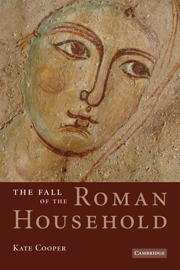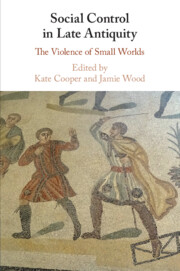Making Early Medieval Societies
Conflict and Belonging in the Latin West, 300–1200
- Editors:
- Kate Cooper, University of Manchester
- Conrad Leyser, University of Oxford
- Date Published: February 2018
- availability: Available
- format: Paperback
- isbn: 9781316503607
Paperback
Other available formats:
Hardback, eBook
Looking for an inspection copy?
This title is not currently available on inspection
-
Making Early Medieval Societies explores a fundamental question: what held the small- and large-scale communities of the late Roman and early medieval West together, at a time when the world seemed to be falling apart? Historians and anthropologists have traditionally asked parallel questions about the rise and fall of empires and how societies create a sense of belonging and social order in the absence of strong governmental institutions. This book draws on classic and more recent anthropologists' work to consider dispute settlement and conflict management during and after the end of the Roman Empire. Contributions range across the internecine rivalries of late Roman bishops, the marital disputes of warrior kings, and the tension between religious leaders and the unruly crowds in western Europe after the first millennium - all considering the mechanisms through which conflict could be harnessed as a force for social stability or an engine for social change.
Read more- Illustrates the power of conflict to create social order, rather than the traditional model of the State
- Spans nine centuries from the Fall of Rome to the ascent of Latin Europe
- Explores the key developments of early medieval history in the light of social anthropology
Reviews & endorsements
'In this groundbreaking collection, the social impact of 'constructive feuding' is analysed in terms of how its potential destructive impact in practice was limited by customary rules. Cooper, Leyser and their colleagues have form in challenging accepted understandings of the past through the redrawing of disciplinary boundaries and this exciting volume poses fresh questions with some unexpected answers.' Jill Harries, University of St Andrews
See more reviews'This valuable collection brings together essays of established and rising scholars who reflect on cohesion and power from late antiquity to the twelfth century. As a whole, these essays accomplish the twin objectives of engaging with recent approaches to the history of power and its representation in the early Middle Ages and at the same time suggesting new ways of understanding power as forms of social and cultural practices rather than in the terms of the long and largely fruitless debate about state vs non-state political orders.' Patrick Geary, Institute for Advanced Study, Princeton
'This is a very valuable book, making a significant contribution to the rich literature on social cohesion and conflict in early medieval Europe. Leading historians take a pleasing variety of approaches both to specific texts and to general questions. The essays will be stimulating reading for all interested in the period and in the engagement of history with anthropology.' John Hudson, University of St Andrews
'Innovative and thought-provoking. … Deftly interweaving disparate methods, time-periods, and regions, the monograph produces a fresh vision of a millennium of Western European history.' Michael E. Stewart, Journal of Social History
'Much important food for thought in this book, which will repay careful reading (and re-reading).' Levi Roach, The English Historical Review
Customer reviews
Not yet reviewed
Be the first to review
Review was not posted due to profanity
×Product details
- Date Published: February 2018
- format: Paperback
- isbn: 9781316503607
- length: 293 pages
- dimensions: 227 x 152 x 16 mm
- weight: 0.44kg
- availability: Available
Table of Contents
Introduction: making early medieval societies Conrad Leyser
1. Property, power, and conflict: rethinking the Constantinian revolution Kate Cooper
2. Playing with fire: conflicting bishops in late Roman Spain and Gaul David Natal and Jamie Wood
3. After Rome, before Francia: religion, ethnicity, and identity politics in Gregory of Tours' Ten Books of Histories Helmut Reimitz
4. 'To mistake gold for wealth': the Venerable Bede and the fate of Northumbria Martin J. Ryan
5. The incidence of rebellion in the early medieval West Paul Fouracre
6. Disputes and documents in early medieval Italy Marios Costambeys
7. Divorce and remarriage between late antiquity and the early Middle Ages: canon law and conflict resolution Riccardo Bof and Conrad Leyser
8. The memory of Gregory the Great and the making of Latin Europe, 600–1000 Conrad Leyser
9. The weight of opinion: religion and the people of Europe from the tenth to the twelfth century R. I. Moore
10. 'The peace in the feud' revisited: feuds in the peace in medieval European feuds Stephen D. White
Bibliography
Index.
Sorry, this resource is locked
Please register or sign in to request access. If you are having problems accessing these resources please email [email protected]
Register Sign in» Proceed
You are now leaving the Cambridge University Press website. Your eBook purchase and download will be completed by our partner www.ebooks.com. Please see the permission section of the www.ebooks.com catalogue page for details of the print & copy limits on our eBooks.
Continue ×Are you sure you want to delete your account?
This cannot be undone.
Thank you for your feedback which will help us improve our service.
If you requested a response, we will make sure to get back to you shortly.
×
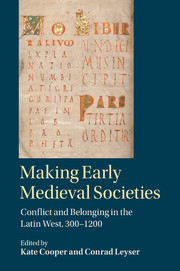

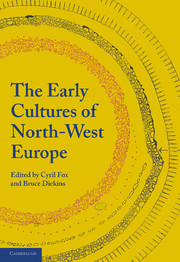
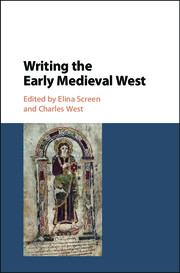
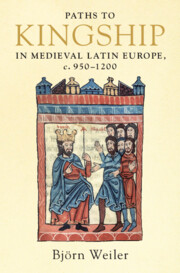
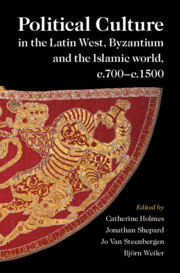
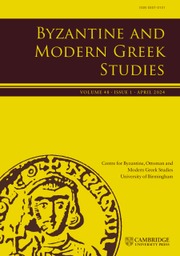
.jpg)
.jpg)


